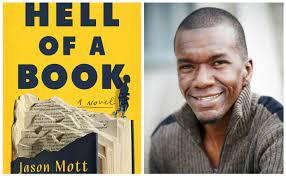
Hell of a Book — that’s the title — by Jason Mott — is actually two different novels coexisting uneasily within one cover.
One is a semi-comical first-person account of the author/narrator’s book tour. He’s Black, but that seems only incidental. There’s a segment with a grotesque caricature of his “media trainer” discussing the imperative to avoid making this a “race book,” about the Black experience.
The other interwoven novel is a race book, about the Black experience.

Does this taco-and-spaghetti combo work? I’m not sure. The race book centers upon a kid who strove for literal invisibility as a way to stay safe. His father became victim of a particularly senseless police shooting. The kid himself is later shot too, and shows up in the author tour book — as a ghost haunting the protagonist.
However, while the two seem clearly the same kid, there’s never any line drawn between the dual father-and-son shootings. Not even by the kid’s widowed mother. I found this puzzling and unsettling.
Elements that might be called magical realism are somewhat accounted for by the author/narrator saying often that he has a “condition,” which is an overactive imagination, so he can’t always tell what’s real or not. This produces much tongue-in-cheekiness, mixing David Foster Wallace style satire and self-parody, and a dollop of Hunter Thompson Fear and Loathing, with what are also actually some pretty heavy reflections, even philosophical ones. Yet much is also keystone cops type stuff. Leaving me unsure how to take the whole thing.

One scene on an airplane has the author asked to sign a book for a fellow passenger. Who turns out to be — or appears to be — the film actor Nicholas Cage. “Oh please,” I said to myself, bracing for more slapstick. And then . . . from Cage’s mouth spill all sorts of surreal and thought-provoking profundities. It’s that kind of book.
For most of it, we understand that the novel we’re reading differs from the protagonist’s eponymous one. It seems its narrator was really bugged by something, which propelled the writing, and which his novel is about. That’s left vague until near the end it’s finally revealed to be his mother’s death. This too I found somewhat disorienting, because the novel in my hands still seemed mainly about racial injustice. The mother’s death (from a stroke), however it may have affected her son (not evident, through most of the text), didn’t have much to do with anything, in terms of this book’s contents.
And meantime, the silliness eventually ceasing, the race book takes over, with the tone become all serious. Overly so, I’d say; even maudlin, oppressive. Long before the end, I’d gotten the point, and had had enough. Though the book tour crashes and burns, the race book’s last few dozen pages, rather than building to a climax, add nothing.

There’s much about “the talk,” that Black parents must give their children, and all that sort of thing. Sorry if that sounds supercilious. I myself have railed about police violence, and the whole larger issue of how non-whites fit in America. But as far as books are concerned, it’s been done. A lot. Ta-Nehisi Coates and so forth. Maybe it’s fair to say there can’t be enough books of that kind. But the problem for an author is how to write one that’s not just yet another in a long parade of such race books. Mott tackles that problem in an idiosyncratic way. Leavening the unavoidable tendentiousness with flakier fare. Again, I’m not sure it works.
And forgive me for this too. I am indeed fully cognizant of what non-white Americans endure. But this book reads, to me, like it’s set in some dichotomous, literally segregated alternate reality where suffering and injustice are experienced solely by non-whites. With no recognition that these are human universals. That white lives . . . .
